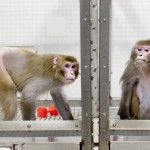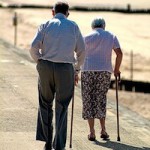Tag Aging
Unparalleled pomp attends professor’s Finnish fete
Sociology Professor Douglas Maynard has received many honors in his career but until recently, they never came with a sword.
Helping seniors stay active, independent through fitness
We all know that exercise is good for us. Yet becoming active late in life comes with a unique set of challenges.
Monkey caloric restriction study shows big benefit; contradicts earlier study
The latest results from a 25-year study of diet and aging in monkeys shows a significant reduction in mortality and in age-associated diseases among those with calorie-restricted diets. The study, begun at the University of Wisconsin–Madison in 1989, is one of two ongoing, long-term U.S. efforts to examine the effects of a reduced-calorie diet on nonhuman primates.
Scientists create road map to metabolic reprogramming for aging
In efforts to understand what influences life span, cancer and aging, scientists are building road maps to navigate and learn about cells at the molecular level.
UW–Madison researchers expanding study on human resilience
Researchers at the University of Wisconsin–Madison's Institute on Aging are studying how adults overcome social and economic challenges and whether it matters for their health, with a special focus on human resilience in the face of adversity.
Genetic pathway critical to disease, aging found
The same chemical reaction that causes iron to rust plays a similarly corrosive role in our bodies. Oxidative stress chips away at healthy cells and is a process, scientists know, that contributes to a host of diseases and conditions in humans ranging from Alzheimer's, heart disease and stroke to cancer and the inexorable process of aging.
Study to examine impact of culture on aging process
A UW–Madison study is analyzing the consequences of cultural differences in people's emotional and physical health as they age.
UW-Madison research at the 18th Annual Colloquium on Aging
The 18th Annual Colloquium on Aging, to take place at the Monona Terrace Community and Convention Center in Madison on Wednesday, Oct. 18, will feature the work of a number of University of Wisconsin–Madison scientists.
Diet, aging study gains $7.9 million grant
A pioneering long-term study of the links between diet and aging in monkeys will continue through 2011 with the help of a new $7.9 million grant from the National Institutes of Health.
Elderly mice yield clues to the process of growing old
Delving deep into the molecular subtleties of a strain of mice engineered to age rapidly, scientists have found that an accumulation of genetic mutations prompts a cascade of programmed cell death that seems to underpin the aging process.
Grant helps center study link between cancer and aging
With cancer death rates far greater for those 65 or older, the National Institutes of Health has selected the UW Comprehensive Cancer Center as one of eight research centers to study the relationship between cancer and aging.
Aging Institute turns 30
An expert on healthy aging, Carol Ryff knows that the UW–Madison Institute on Aging (IOA) -turning 30 years old this month - has aged well.
Ongoing study checks in on ‘Happy Days’ cohort
For 45 years, the Wisconsin Longitudinal Study has provided policy makers and social-science researchers with an unparalleled look at how education, career and family affect adult life. Now, as those one-time high school seniors ÷ known as the "Happy Days" cohort after the popular television sitcom about Milwaukee's class of 1957 ÷ become senior citizens, a new survey will seek to understand more specifically how a person's entire life influences, and can improve, the aging process.
UW-Madison leads $26 million study on aging
While we all age, we age in different ways. But exactly why we age differently remains much of a mystery. A new $26 million study led by the University of Wisconsin–Madison, however, plans to make the reasons more clear.
Study details genetic basis of aging — and how it might be delayed
Scientists at UW–Madison have, for the first time, profiled specific genetic changes during the aging of experimental animals, a discovery that could aid work to extend life span and preserve health.
The Biomarkers of Aging
The biomarkers of aging are a set of bodily functions and conditions that tend to change with age. They are the same in humans as they are in non-human primates such as rhesus macaques.







